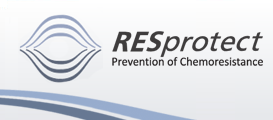| Initiation of a Phase 2 Trial |

|

|

|
INITIATION OF A PHASE 2 TRIAL OF RP101 IN LATE-STAGE PANCREATIC CANCER PATIENTS Dresden, February 6, 2008: RESprotect´s US development partner, SciClone Pharmaceuticals, Inc. (NASDAQ: SCLN) announced that the first patient has been dosed in its phase 2 clinical trial using RP101, a nucleoside analog which may act to enhance the beneficial effect of chemotherapy, for the treatment of pancreatic cancer. RESprotect, the inventor of the RP101 oncology technology, has granted in 2007 the exclusive rights in the United States and Canada to develop and commercialize RP101, a clinical-stage compound for the treatment of cancer, to SciClone Pharmaceuticals, Inc. (Nasdaq:SCLN). SciClone acquired the rights from Resistys, Inc., which acquired it 2004 from RESprotect. SciClone performs clinical studies with RP101. The results are freely available to RESprotect. Dresden, February 6, 2008: RESprotect´s US development partner, SciClone Pharmaceuticals, Inc. (NASDAQ: SCLN) announced that the first patient has been dosed in its phase 2 clinical trial using RP101, a nucleoside analog which may act to enhance the beneficial effect of chemotherapy, for the treatment of pancreatic cancer. RESprotect, the inventor of the RP101 oncology technology, has granted in 2007 the exclusive rights in the United States and Canada to develop and commercialize RP101, a clinical-stage compound for the treatment of cancer, to SciClone Pharmaceuticals, Inc. (Nasdaq:SCLN). SciClone acquired the rights from Resistys, Inc., which acquired it 2004 from RESprotect. SciClone performs clinical studies with RP101. The results are freely available to RESprotect.
About the Phase 2 Trial: The randomized, placebo-controlled, double-blind phase 2 clinical trial will be conducted at 55 sites throughout the United States, Europe and South America. SciClone plans to enroll a total of 153 late-stage pancreatic cancer patients, randomized with two patients assigned to the treatment arm for each patient assigned to the control arm. Patients will receive gemcitabine plus RP101 – in the treatment arm - or gemcitabine alone – in the control arm - for three weeks, followed by one week of rest, for each of six cycles. The primary endpoint is overall survival, with a secondary endpoint of progression-free survival. It is expected to complete enrollment of the 153 patients in the first half of 2009 and report data in the first half of 2010. About Orphan Drug Designation: In November 2007, RP101 was granted Orphan Drug designation for the adjunct treatment of pancreatic cancer by the U.S. FDA. This designation will allow SciClone a seven-year period of market exclusivity once RP101 is approved. RESprotect will apply for the European EMEA orphan drug designation in 2009. About RP101: RP101’s potential efficacy for treating cancer patients was discovered by the founder of RESprotect, Prof. Fahrig. RP101 has been evaluated in combination with cytostatic agents such as gemcitabine which is used to treat pancreatic, lung, ovarian and breast cancer patients. Although approved in several European countries for antiviral indications, RP101’s potential efficacy to combat chemoresistance and improve chemosensitivity constitutes a new clinical use for RP101 which is protected by three use patents by RESprotect. In two separate, unrelated phase 1 clinical trials with late-stage pancreatic cancer patients, RP101 was used in combination with gemcitabine, the current standard of care, or gemcitabine + cisplatin. The results were published in 2006 (Fahrig, et al., Anti-Cancer Drugs 17, 2006, 1045-56). In summary, RP101 co-treatment approximately doubled median survival. Moreover, 4 - 5 times more patients with far metastases (stage IV) survived one year or longer in comparison with the gemcitabine-alone group. About RESprotect: RESprotect GmbH is a privately owned Biotech Company located in Dresden/Germany. RESprotect is focusing on the inhibition of chemoresistance and the enhancement of chemosensitivity. Chemogenomics, the approach of Resprotect, focuses on the application of small synthetic molecules, which elicit favourable phenotypic changes. The combination with genomic tools concentrating on specific biological pathways allows a better understanding of the broader effect of a drug. Thus, it is possible to discover drugs that target the cause of a disease rather than its symptoms. RESprotect's compounds are given additionally to standard chemotherapy. In contrast to the well known efforts to circumvent or decrease existing chemoresistance, RESprotect´s approach is unique.
|


